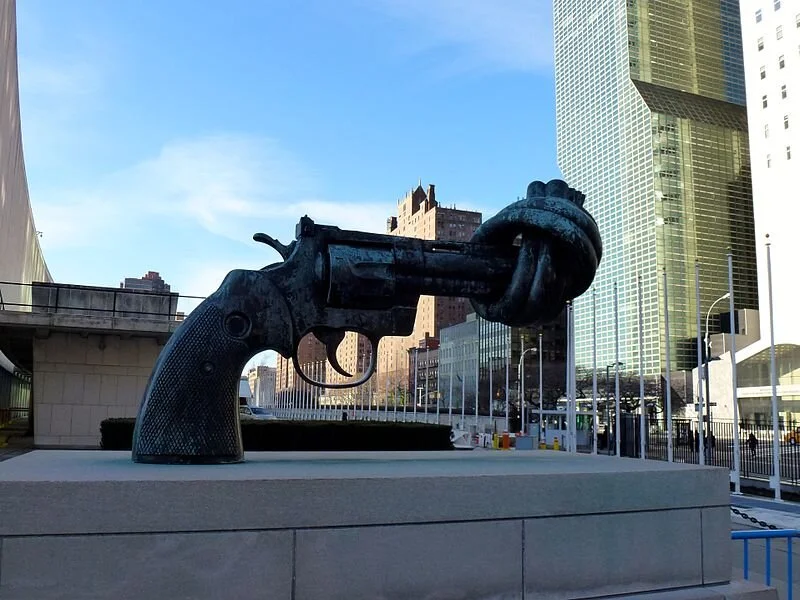Die Prinzipien "Hilfe vor Ort" und "Vorbeugen ist besser als Heilen" stehen hoch im Kurs. Einfaches Wegducken, militärisches Drüberbügeln und nachträgliches Reparieren kosten und sind zunehmend unpopulär. Die türkis-grüne Bundesregierung hat sich im Regierungsprogramm auf die Prüfung der Einrichtung eines Zivilen Friedensdienst in Österreich verständigt - ein Pionierprojekt entsteht.
Austria and its Neutrality—A Tradition with Potential
On October 26, 1955, two related events occurred in Austria. On the one hand, it was the first day without allied soldiers on Austrian territory. That outcome had been agreed on in the “State Treaty,” of May 15, with the victors WWII powers, Britain, France, the US, and the USSR. Thereby, Austria fully regained its independence. On the other hand, it was also the day on which the country came true on a promise that the Raab government had made to obtain the Soviet approval to the treaty: the parliament enacted a federal law which established that for “the purpose of the permanent assertion of its independence and (…) the inviolability of its territory, Austria freely declares its permanent neutrality.”
EU OFFERS AGAIN TO HELP WESTERN BALKANS - BUT WE NEED MORE
With all the crises in the Middle East, the Eastern Mediterranean and the South Caucasus, one could forget to deal with the problems of the EU’s immediate neighbors in the Western Balkans. The slow progress and the permanence of unsolved issues of course help to forget and overlook this area. But of course not for the IIP, which pays special attention to the youth of that region. And also for the Vienna Institut for International Economics - WIIW, which deals strongly with the economic development of that area, there is no forgetting. And recently, the European Commission published its progress report on enlargement and a proposal for an investment package for the Western Balkans. Reason enough to look closely to the Western Balkans issues and challenges.
War in the Caucasus: A Perspective from Armenia
In the early morning of September 27, 2020, Azerbaijan launched airstrikes and a large-scale offensive against Artsakh. The capital of Artsakh, Stepanakert, and main settlements are still under heavy bombardment. This time Turkey is also involved, it supplies Azerbaijan with Bayraktar Tactical unmanned aerial vehicles (UAV) and, as the Armenian Ministry of Defence informed, Turkish F-16 fighters are also taking part in military operations.
War in the Caucasus. Nagorno-Karabakh: From a Local Conflict to a Regional War? 🎬
War in the Caucasus. Kamikazedrohnen über dem Kaukasus 🗞️
‘Individual sovereignty’ in pandemic times – a contradiction in terms?
Over the past months, appeals to ‘individual sovereignty’ have brought together a wide range of political actors across Europe, united in their rejection of face masks, ‘social distancing’, and other forms of state-imposed regulation of behavior and mobility. Opposition to state efforts to govern the spread of the pandemic has created, indeed, the most unlikely of coalitions—from anarchists and natural health proponents to anti-vaxxers and libertarians of all stripes (from the radical-ecological to the right-nativists)—all mobilizing around a purported defense of ‘personal freedoms’ and ‘individual rights’ against the sovereign power of states.
Europas Herausforderung durch Flucht: neue EU Vorschläge
“Wir können alleine nicht alle Probleme der Welt lösen, aber wir können - und sollen - unseren Teil dazu leisten“ meinte einmal der ehemalige französische Premierminister und EU Parlamentarier, Michel Rocard. Diese Aussage ist einerseits sehr pragmatisch aber auch zugleich moralisch. Ich würde mir wünschen, die österreichische Regierung und auch manch andere EU Regierungen würden sich daran halten. Aber auch horrende Zustände in manchen Flüchtlingslagern und der jüngste Brand im griechischen Flüchtlingslager Moria haben die Herzen, vieler sogenannter christlicher PolitikerInnen, nicht erweicht.
Weitere Sanktionen gegen Russland - Stopp für Nord Stream 2?
Wieder einmal sind - weitere - Sanktionen der EU gegen Russland im Gespräch. Anlass ist die Vergiftung des bekanntesten, wenngleich umstrittenen Oppositionspolitiker Aleksej Nawalny. Allerdings kommt auch das russische Verhalten in Bezug auf die Krise in Weißrussland hinzu. Putin mag keine Demokratie zu Hause und keine in seiner Nachbarschaft.
TÜRKEI: EU-KANDIDAT, PARTNER UND GEGNER
Die Türkei macht wieder Schlagzeilen. Präsident Erdoğan ist unermüdlich dabei, der Türkei eine neue regionale Rolle und ein neues politisches System zu geben. Eine Mischung aus traditionellem Nationalismus, aus neu entwickeltem Islamismus und aus wiederentdecktem Großmachtdenken soll die Türkei - und vor allem Präsident Erdoğan - zu einer Stellung verhelfen, an der niemand vorbeikann. Das ist nicht nur an politischen Handlungen erkennbar, sondern wird auch „kulturell“ untermauert. Ein kürzlich präsentiertes Video, zeichnet die Neuinterpretation der Geschichte von der Eroberung Istanbuls bis zur Rückverwandlung der Hagia Sophia in eine Moschee nach. Von Mehmet, dem Eroberer, bis zu Erdoğan wird eine Linie gezogen, die die säkulare, republikanische Zeit vergessen lässt. Und alle türkischen Staatsbürger - unabhängig davon wo sie leben - sollen sich an dem von Präsident Erdoğan vorgegebenen Leitbild orientieren.











